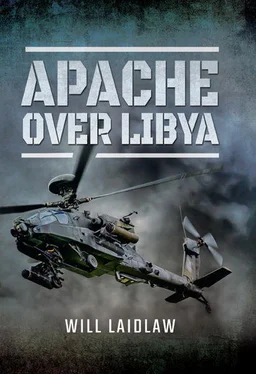‘Well, that just about covers it then!’ I replied. ‘You’ve been thinking about this, haven’t you!’ I was about to take delivery of more ammunition than we fire in a year in Afghanistan and, judging by the descriptions of the sort of targets available in Libya, we were likely to use most of it.
Chris and I went up to the Wardroom to talk the detail. His monologue continued:
We have just three days to get everything done in Cyprus and then you will head for Libya and I must get across to the NATO air planning place in Italy. Lieutenant Colonel Jack Davis is already there. He’s been up in London with the CO and they’ve decided to put a team in Italy where the air campaign is being planned. He’s short of people so I’m heading over there after we’ve put you through your paces.
When Chris is talking about plans there is little point interrupting. I listened.
I have organized a mission rehearsal exercise for the next three days. We can put each of you through a day and a night live firing range at sea. After that we’ll switch to mission specific training. I’ve arranged a night-time low-level raid for a simulated strike against targets on land. I’ll do my usual judgemental training scenarios and test your crews on their fast decision-making and understanding of the ROE. [3] Rules of Engagement
He set out the plan for our only opportunity for tailored training. We would normally have preferred a month of training, putting each crew through a graduated series of sorties and range work. There was no time for this. One sortie on the range by day and another by night was all we had on the trigger. Then, the big one-shot only per crew sortie against simulated targets ashore. Three sorties each, and just three days to get it all done. We would need all our aircraft serviceable day and night. Live ammunition meant all the ground crew would be working flat out for the daytime ranges and then late into the night for the evening sorties. Aircrew, operations soldiers, flight deck teams and the REME were all going to work all hours just to get us ready for the operation. And we had to reach a very high quality line if the Commodore was going to be happy with our ability to cope with the risk we were preparing for in Libya. Chris continued:
You need to practise the low-level, no-lights formation flying over the sea running into dynamic concurrent attack profiles against pop-up targets. I’ll set up one deliberate target to test the planning and coordination. Once that is struck you’ll return to Ocean and wait on deck on alert for a time-sensitive opportunity target. That one will test on the hoof planning and coordination as well as ROE and command decisions. I’ll make it as tricky as I can and we’ll debrief over the phone each night.
I had everything I needed – times, dates, outline targets and a one-shot training opportunity to prepare the team. Now it was time to tell them.
With the Task Group travelling in convoy for Cyprus, Ocean and Albion were still together and it was only another three-minute Lynx flight back to Mother. I headed for the wardroom to catch lunch and found Nick Stevens picking over the last of the salad. He was alone.
‘Where’s everyone else?’ I asked.
‘We’ve got one aircraft to ground run and the rest are building Hellfire targets with Mr Hall. He’s going to run another range south of Cyprus, if we get permission. Should do day and night RF and 30mm. We have loose dates for the end of the month. I don’t suppose there will be any live firing when we get to Albania.’ Nick was his usual picture of calm. ‘How was your session with the big planners?’
I had my serious face on. I had news to tell. Big, fearsome, exciting news. ‘We’re not going to Albania… we’re going to Libya.’ These words have lingered in my head ever since. The speculation was over, now we were getting into the fight. We all wanted a part in this. I laid out the facts: ‘We need to get the aircrew, Doug and Charlotte together. We only have a few days to do everything. They want us in Libya at the end of next week. We’ll be in Cyprus tomorrow, then three days with Chris smashing us though a rehearsal exercise and then we’re off. There’s no time to get anything wrong, and a raft of senior officers are coming out to tell us how it is.’
He nodded, slow and deliberate and, adding a smile to the calm. ‘Six days. Libya in six days? Busy. Yes, busy, but doable!’
‘Let’s have a cup of tea and I’ll fill you in on the detail.’ We went on to the quarterdeck and in the early afternoon heat and noise of a Royal Navy ship at sea I explained the situation. ‘This is really big. I’m surprised. Very risky. I know we’re up for it and we’re good enough, but this is dangerous stuff. There are thousands of MANPADS, thousands. We’re the only thing flying that’s in range. Some Gaddafi fast jet got shot down in April by one.’
Nick was ahead in his thoughts. ‘Where are we going? Is Royal going on the ground?’
‘No. No boots on the ground, no policy shift there. Royal’s getting off, he’s not coming. It’s us, just us and the SKASaCs. They want us to do strikes against targets NATO will give us. All part of the air campaign. All new.’
‘When do we get the target?’
‘Targets, targets. Not a one-off. Lots. Chris is joining the Apache planning team in NATO in Italy at the weekend. He’s our man, with Jack Davis. They’ll shape it, make sense of all that badges and watches and flying suits stuff they love, and give us the mission in soldier talk.’
The conceptual work was over. Conflict, unexpected conflict, had chosen us. We had less than a week to get ammunition, another Apache, swap people in and out, and get into the low-level, no-lights formation over the sea to practise firing and defensive flying. Wild times were upon us. Privately I wondered if we would all survive.
In Ocean we had a planning space know as the flip-flop. There was an upper and a lower flip-flop, a steep ladder separating the two. We had the lower, no one used the upper. The lower flip-flop was our planning, debriefing and general working space. Weapons, morphine, secret computers and phones and usually more people than there was room. The team gathered in the flip-flop. I arrived last and launched straight into the detail.
‘Here’s what I know. We are going to launch Apache strike missions into Libya…’
In a four-minute brief the atmosphere went from silent nodding to smiles and serious faces. The proposition was unprecedented, seductively dangerous and way beyond our expectations. Overwatch of a boarding party checking out some knackered fishing boat, or even a NEO, had seemed likely, but a proper low-level charge into the brutal might of Gaddafi’s army was breathtaking. We all knew what this meant to us: that thousands of shoulder-launched missiles would be coming out, that the triple-A would meet us, that every man with half a chance at fame would take a shot. We were heading right into the middle of it all.
I didn’t want anyone to know we were coming. Any warning, however vague, might give pro-Gad the percentage point he needed to kill us. I wanted all of this to be a secret. I wanted the first realization of our involvement to come when our first missile hit. But that wasn’t the mission. Adding helicopters to the campaign was about putting psychological pressure, also known as ‘cognitive effect’, on the regime. Just as a picture of an Apache firing missiles at sea in early May was a signal, speculation surrounding our deployment ricocheted around the internet, telly and print media. Five days in late May made nervous reading for families at home: ‘Apache Attack Helicopters to be Sent into Libya by Britain’ ( Guardian , 23 May 2011), ‘Libya Apache Deployment Approved by David Cameron’ (BBC, 27 May 2011) and ‘Libya: Apache Attack Helicopters to be Deployed within 24 Hours’ ( Daily Telegraph , 27 May 2011).
Читать дальше












